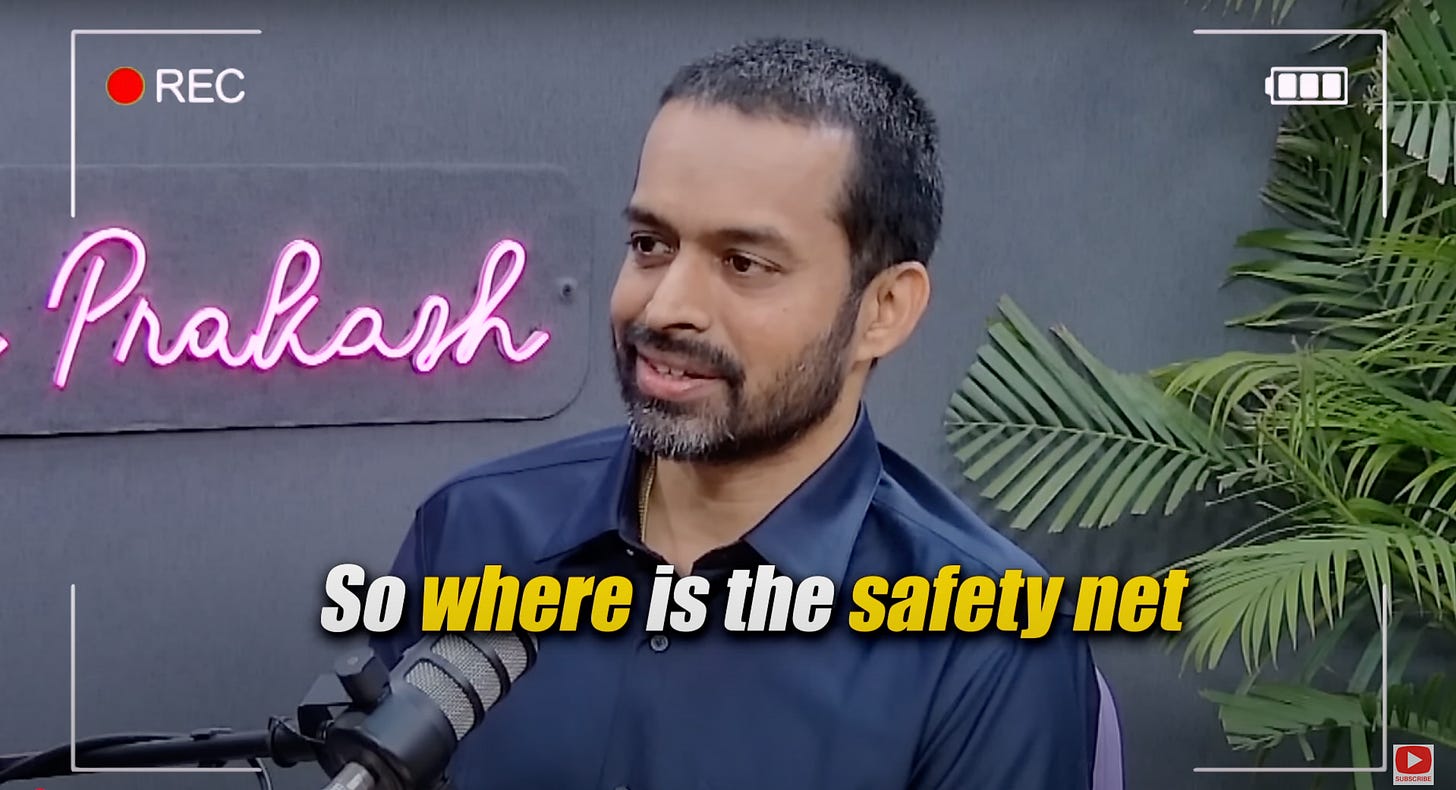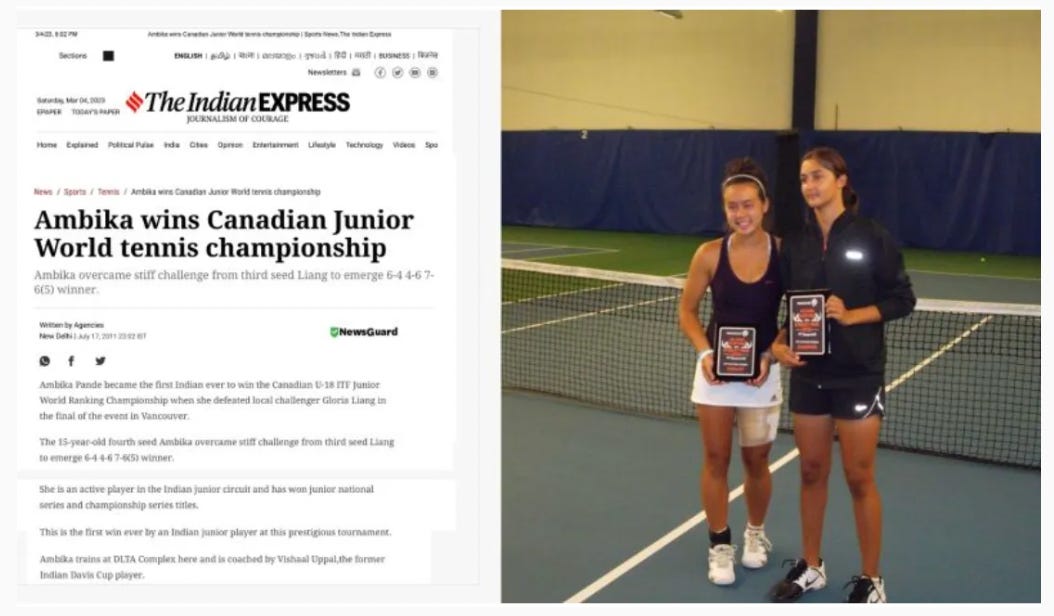[#58] When the Game Ends: The Hard Truth About Sports Careers in India
Pullela Gopichand made a statement: "Don't put your kids in sports unless you are rich." And that's because the Indian system is not set up to support athletes who gave everything but didn't make it.
Some time ago, Pullela Gopichand, or Gopi Sir, as I call him, was quoted as saying: “don’t put your child in sports unless you are rich.”
His reason is simple: less than 1% of people who take up sport end up making it their career. Majority of athletes who either don’t make it, or even those who medal, end up working in the Railways or in PSUs, where their sports achievements are never really given due credit. In the government run bodies, they end up working under folks who have gone the academic way, taken competitive exams (which is also in itself tough), and now reap the benefits of going through the academic route until retirement. Simply speaking, it seems that their career as sportspersons fail to have relevance once they stop playing sport. Starting again really does mean starting from scratch.
The link to the full interview of Pullela Gopichand can be seen here
The movie Dangal is a great example. Of course, it’s fictionalized to some extent, but as Mahavir Phogat says in the movie: “I was able to earn medals and respect for the country, but I wasn’t able to earn money.”
The fact of the matter is that in India, apart from cricket, sports as a career path is not really one that is taken seriously, nor are the non-sports skills that one accrues from it. And it puts a lot of pressure on kids who play, especially on those who don’t have a “safety net”, because there is added pressure of not being able to take care of your family, wasting your family effort and money and so on, especially if you’re not one of the top few who get sponsorships.
I used to play professional tennis. I was ranked top 5 in India. Top 200 in the world juniors. Basically dropped out of school in 10th grade to play full time. And won tournaments across Canada, Jordan, India, and SE Asia. Went on a full scholarship to the US, and played in tennis in the SEC. With hard work & a touch of providence and destiny I started doing well in the juniors, so I was sponsored by Babolat and MakeMyTrip.
When tennis didn’t happen because of injury, it took me some time to get over that. And I thought that I had my college degree to fall back on, which is also a way of thinking in India. But what a lot of people don’t realize is: when you go to college to play professional sports, you don’t really study the way other students study. There’s a difference between a good sports university and a good academic university. Some universities are excellent for sports, but don’t always have an academic name. This matters especially when you’re an international student and require a sponsor to get a working VISA.
But even when I came back to India, the one thing that kept me going was the fact that, hey - I played sports. That was a spike in my resume. And there are a dime and a dozen interviews where leaders & CXOs talk about the importance of sports and how they look to hire sportspeople, because of what sports teaches us and so on. So I was optimistic that this is what will help set me apart. Linkedin & Youtube are full of podcasts and articles such as the below, talking about why you should hire athletes. Case in point below: and I’m sure many of us have seen infographics like this time and time again circulate on our social media.
Unfortunately, that wasn’t the case for me. At best, my sports experience was an interesting anecdote. I had to start from scratch. And because my foundational years were spent in playing tennis, and not academics, I had put in that extra effort to “catch up” to my peers, who had already been in the corporate space for a while, and understood how it worked and so on. At one point, I remember thinking that if I hadn’t played professional sports and instead just gone the regular route of academics, I’d probably be in a better position in my career.
I used to give interviews and highlight my sports background, and the fact that I played & represented India internationally. But no one knew how to translate it into a corporate career, nor did they understand what it takes to play competitively at that level, equating it to “playing state, or playing for your school.”
To play at a world level is escalation to another degree. It takes fortitude and grit and crisis-management that isn’t generally seen in a corporate setting. But it’s not something that can be explained to someone who hasn’t experienced it. What is a punchline in today’s corporate world - tenacity, discipline, and drive to win, are very tangible actions in sports, and the difference between winning and losing.
Let me put it this way - I was on court for 8 hours a day. For years, I lived out of a suitcase, just travelling and training, and playing matches. It was eat, sleep, play, and repeat. That’s not just a hobby. And the Indian system is not set up to support the athletes who didn’t make it - who could still bring immense value to a table that simply is not equipped to measure it. We all see the Neeraj Chopra’s and Virat Kohli’s of sport. But the ones who tried and didn’t make it are not named, and not taken care of. And the value that they could bring as former sports-people, is not seen.
I mean, we don’t even take care of our current sports people. The Brij Bhushan case in 2023 is a prime example. You can read more about it in the piece below:
I got lucky. I got sponsorships at the right time. I had a coach who understood what it took. My family supported me. And when tennis didn’t work out, I had their support. So even starting from scratch, and essentially rebuilding myself wasn’t really “from scratch.” And I got into ISB as a school, looks for a diverse set of people, which served as a springboard for my second career.
And that’s what Gopi Sir is saying. A lot of athletes don’t have the privilege that I did. They don’t have a back-up. And when their sports dreams fail, they’re left with not a lot, except some job and pension that perhaps doesn’t give due respect to the skills that they actually have and could bring. And because foundational years are spent in sport, a lot of them are stuck and they end up playing second fiddle to folks who went the academic route.
Sports people have a lot to give back. I’d say a lot of who I am as a person today is because I played sports. But it was my academic background that gave me the opportunity, and opened doors for me to then display the skills I learned through sports. No one gave me a shot because I played professional tennis. It’s a cool story now, since I was able to make the transition. But that’s all it remains.
Gopi sir is right. There’s no structure set up today for sports as a career, apart from the top 1-2%.
And if we want sports to exist as a career, and not just for the 1-2% who will achieve superstardom, but for the top 10% - 15% who can continue to play, and do what they love, and use their sports experience and actually benefit in corporate and not just PSUs, we need systems set up for that. And for leaders, instead of just talking about it in podcasts, to actually put their money where their mouth is.




